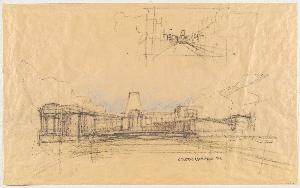Isozaki Arata
Isozaki Arata;Arata Isozaki
Place: Ōita
Born: 1931
Death: 2022
Biography:
Arata Isozaki was a renowned Japanese architect, urban designer, and theorist born on July 23, 1931, in Ōita, Japan. He was the eldest of four children of Toji and Tetsu Isozaki. In 1945, he witnessed the destruction of Hiroshima on the shore opposite his hometown.
Early Life and Education
Isozaki completed his schooling at the Oita Prefecture Oita Uenogaoka High School and graduated from the University of Tokyo majoring in Architecture and Engineering in 1954. He completed a doctoral program in architecture from the same university in 1961.
Career and Achievements
Isozaki was awarded the Royal Gold Medal in 1986 and the Pritzker Architecture Prize in 2019. He taught at Columbia University, Harvard University, and Yale University. Isozaki's work has been recognized globally, and he is considered one of the most influential architects of his time.
Notable Works and Projects
Some of Isozaki's notable works include the Museum of Modern Art in New York City, the Japanese Pavilion at the World Expo in Osaka, and the Arata Isozaki's own museum in Ōita. His work has been exhibited at various museums, including the Museum of Modern Art in New York City, and the Centre Pompidou in Paris.
- Top 5 Famous Expressionism Artists of All Time
- Isozaki Arata | Arata Isozaki was a Japanese architect, urban designer, and theorist born on July 23, 1931, in Ōita, Japan.
works by Arata Isozaki can be found at the The Ukiyo-e Art Movement, and his biography is available on Wikioo.org. Isozaki passed away on December 28, 2022, in Naha, Okinawa Prefecture, Japan.
Legacy and Impact
Arata Isozaki's legacy continues to inspire architects and designers around the world. His work has been recognized for its innovative use of materials, shapes, and forms, and his influence can be seen in many modern buildings and structures. As a Japanese architect, Isozaki's work has had a significant impact on the development of modern architecture, and his legacy will continue to be felt for generations to come. Key aspects of Isozaki's work include his use of concrete, steel, and glass, as well as his innovative designs, which have been recognized globally. His work has been exhibited at various museums, including the Museum of Modern Art in New York City, and the Centre Pompidou in Paris.

